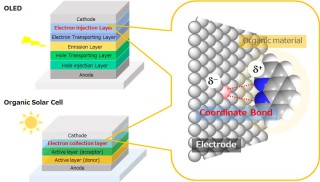Developing a New Technology for Contributing to Higher Functionality of Organic Electronic Devices
NIPPON SHOKUBAI CO., LTD. (Headquarters: Osaka, Japan, President: Yujiro Goto, hereinafter “Nippon Shokubai”), has developed novel electron injection*1 technology in collaboration with Japan Broadcasting Corporation (Headquarters: Tokyo, Japan, President: Terunobu Maeda, hereinafter “NHK”), that contributes to lower power consumption and longer operating lifetime of organic electroluminescence device (OLED) and can be used to enhance the performance of various organic electronic devices.
Until now, electron injection materials such as alkali metals have been used in organic electronic devices, including OLEDs, to facilitate the smooth injection/extraction of electrons between metal electrodes and organic materials. However, since alkali metals are susceptible to oxygen and moisture in the air, it requires strict encapsulation, which is an issue for spreading of organic thin film devices.
To address these issues, Nippon Shokubai and NHK have developed a new electron injection technology by using polarization*2 between the metal and organic materials caused from coordination bonds*3, and have discovered that the OLED having low power consumption and long operational lifetime can be achieved without the use of highly reactive alkali metals.
This new electron injection technology based on coordination bonds not only contributes to low power consumption and a long lifetime of OLED, but is also expected to improve the energy conversion efficiency of organic solar cells and high sensitivity of organic sensor devices by applying it to electron extraction technology. This is expected to contribute to the early achievement of flexible electronic devices.
In addition, this technology will enable the iOLED film light source under development to be manufactured using existing facilities, can be expected to significantly reduce manufacturing costs by simplifying the manufacturing process.
The material used in this technology is an organic base, which forms stable complexes by coordination to various metal elements, and charge polarization occurs between the metal atoms and the organic compound depending on the strength of the coordination force. By designing and comparing several derivatives of this organic compound, we observed that there is a correlation between the coordination strength and the electron injection property in OLED, and it is clarified that the polarization generated at the interface between the organic compound and the metal-containing cathode promotes electron injection.
This research has been published in Nature Communications on July 24. (Issue 11, Article No. 3700)
*1: Supplying electrons from an electrode to an organic material.
*2: A state in which a positively charged part and a negatively charged part are generated.
*3: Bonds formed by donating the electrons of an organic compound to a metal.
About NIPPON SHOKUBAI Co., Ltd.: Since 1941, Nippon Shokubai has grown up its business with unique catalyst technology. Nippon Shokubai has supplied, for example, ethylene oxide, acrylic acid, automobile catalysts, process catalysts and so on. Among all, our global market share of superabsorbent polymer is the largest in the world now. Nippon Shokubai is a global chemical company operating under its corporate mission “TechnoAmenity-Providing affluence and comfort to people and society with our unique technology.” https://www.shokubai.co.jp/en/
【Contacts】
Investor & Public Relations Dept.,
NIPPON SHOKUBAI CO., LTD.
TEL: +81-3-3506-7605 E-mail: shokubai@n.shokubai.co.jp

[Files]